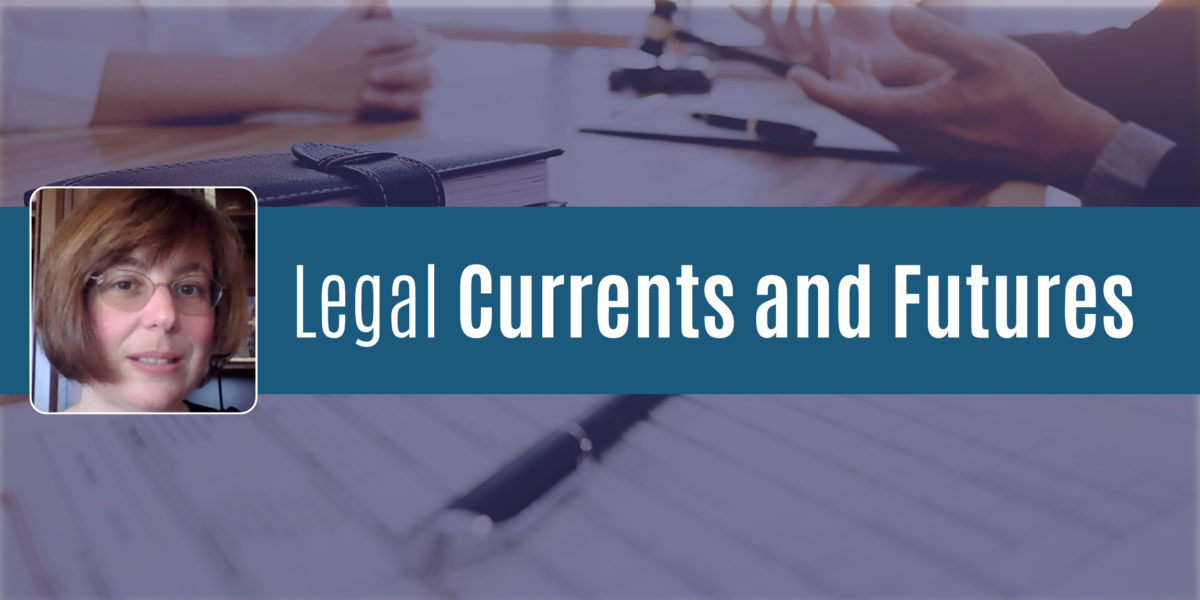In the latest post in the Legal Currents and Futures series, Jeanne Eicks, J.D., discusses some proper uses of AI in the legal industry.
In the last two blogs, I discussed ChatGPT and its strengths and weaknesses as a tool for legal professionals. As discussed, these large language model AIs can demonstrate bias and a general lack of knowledge, and sometimes they fabricate an answer. How can the human using ChatGPT avoid these pitfalls or at least minimize them? The answer may be found in how the prompt interacts with the AI. In most cases, rephrasing or enhancing the prompt will return a more valuable response.
AI’s effectiveness relies heavily on the quality of writing prompts its users provide. Crafting well-written prompts can significantly improve the performance of AI-powered language models and maximize their potential in legal practice. Precise prompts with specific instructions and context generally provide the best answers. The utility of AI in the legal realm, especially when using advanced language models such as GPT-4, is directly proportional to the clarity and specificity of the prompts provided. Vague or ambiguous prompts yield imprecise or irrelevant responses, potentially causing confusion or poor outcomes for clients. Conversely, well-constructed prompts enable AI to produce the best information possible.
Suggestions for Effective Prompts
Leverage your legal expertise and experience to create a legally relevant and contextually appropriate prompt that guides the AI to provide valuable responses. Context, explicit instructions about the desired outcome, and clear and concise language within the prompt will generate the best AI responses. And if those techniques do not produce the desired result, rework the prompt, doubling down on context and specificity. Try to understand what went wrong, then rewrite the prompt to generate a better outcome. Remember to address potential bias in the AI’s response by directly stating the bias risks in the prompt. Most AI have guardrails designed to prevent biased answers, so offering the AI a lesson about bias in the prompt’s context should prevent the response from showing that bias. Finally, revise your prompt until your answer is satisfactory, or it becomes clear that the AI lacks the information necessary to respond helpfully.
Here are some examples of good prompts:
- Write a brief analysis of the potential legal issues in a product liability case involving a defective consumer product. This prompt is specific and clear, and it provides enough context for the AI to generate a relevant response.
- Write a brief analysis of the potential legal issues in a California product liability case involving a defective kitchen appliance, focusing on strict liability, negligence, and breach of warranty claims under the California Civil Code. This prompt is even more specific than the first, and it provides even more context for the AI to generate a relevant response.
- Summarize the key points of the GDPR, focusing on the implications for data controllers and processors. This prompt is clear and concise, and it provides enough information for the AI to generate a relevant response; however, more context and specificity would enhance the prompt. Summarize the key points of the GDPR, emphasizing the obligations and responsibilities of data controllers and processors under Articles 24, 25, and 32, and the potential consequences of non-compliance.
- Provide an agreement between a graphic designer and a small business for the creation of a logo. This prompt provides enough context for the AI to generate a relevant response, but the following prompt would improve the response by adding the jurisdiction and some specific terms of the agreement. Provide an agreement between a graphic designer and a small business for the creation of a logo. The agreement should include an appendix that describes the scope of work and delivery timeline. When the final designs are delivered, the payment of $5,000 is due in full. This is a work-for-hire agreement. The agreement will be governed by the laws of California.
A legal professional’s knowledge and expertise are required to craft prompts that will generate valuable results. Contextualized, explicit, prompts that minimize ambiguity and address potential biases stand a better chance to generate accurate and valuable content. Legal professionals that master the art of prompt writing will be able to leverage the value of AI as a tool to enhance legal productivity and efficiency.
To learn more about the Juris Doctor, the Hybrid Juris Doctor, or Master of Arts in Law program at The Colleges of Law, fill out the form below.

